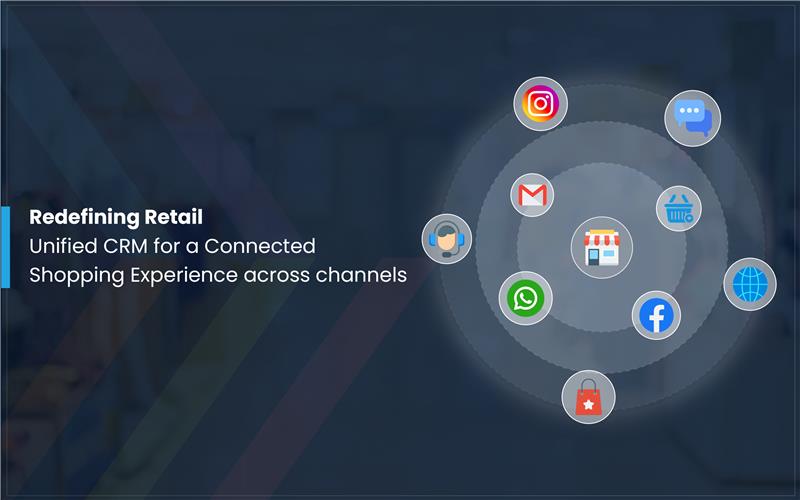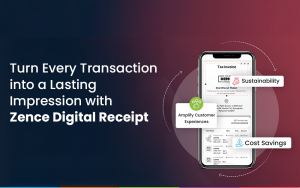In today’s retail world, shopping is no longer tied to a single channel. A customer might browse a product in-store, check reviews on a mobile app, and finally make the purchase through WhatsApp. This shift is redefining customer engagement, and only businesses with the right technology backbone can keep pace.
That backbone is a modern CRM, bringing together physical stores, digital platforms, and conversational channels into one seamless customer journey.
Understanding Omnichannel Retail
Omnichannel retail is more than just being present on multiple platforms. It’s about creating a consistent, connected, and personalized experience across all customer touchpoints:
- Storefronts – From physical outlets to e-commerce websites
- Apps – Brand mobile apps that drive browsing, loyalty, and purchases
- WhatsApp Commerce – Conversational selling where customers explore catalogs, ask queries, and complete orders directly in WhatsApp
Customers today expect to switch between these channels without friction. If they start browsing in-store, continue on an app, and complete the purchase on WhatsApp, the brand should remember their journey, preferences, and past interactions. This level of continuity builds trust, drives conversions, and strengthens loyalty.
Challenges brands face in the Omnichannel era
Omnichannel retail may sound straightforward; be present everywhere your customer is. But in practice, creating a truly connected experience across storefronts, apps, and WhatsApp commerce comes with its own set of challenges. Let’s break them down:
- Fragmented Data: Most retailers collect data from different channels like store billing systems, e-commerce websites, mobile apps, and even WhatsApp chats. The problem? These data points often live in silos, making it impossible to get a single, unified view of the customer. This means retailers may know what a customer purchased in-store but not what they were browsing in the app or asking about on WhatsApp.
- Inconsistent Experiences: When systems don’t sync, customers face disconnects. For example, a customer may receive a discount code via email, but when they shop in-store or interact over WhatsApp, the staff or system may not recognize it. Such disconnects frustrate customers and weaken trust in the brand.
- Lack of Personalization: Today’s shoppers expect more than generic offers. They want experiences that reflect their preferences, past purchases, and real-time needs. Without real-time insights across channels, personalization becomes guesswork. Instead of timely, relevant nudges, customers get irrelevant messages which often push them away rather than draw them in.
- Missed opportunities on WhatsApp Commerce: WhatsApp has quickly evolved into a commerce and engagement powerhouse. Customers are comfortable browsing catalogs, asking questions, and even making purchases right in the app. Yet many retailers treat WhatsApp as just another communication channel, not integrating it into their CRM strategy. This leads to missed opportunities to convert conversations into sales and build stronger loyalty.
The Role of CRM in connecting Storefronts, Apps & WhatsApp
A CRM purpose-built for omnichannel retail bridges the gaps by:
- Unifying customer profiles across offline, online, and conversational channels
- Tracking every interaction—from in-store browsing to WhatsApp queries
- Enabling real-time engagement with personalized offers, loyalty points, and instant updates
- Turning WhatsApp conversations into transactions with ease
With CRM at the center, brands can connect the dots so if a customer checked out a product in-store yesterday, they can get a friendly, personalized reminder on WhatsApp today, gently encouraging them to complete the purchase.
Benefits of an Omnichannel CRM approach
When retailers bring all customer interactions together with an omnichannel CRM, the results go beyond just smoother operations; they transform the way customers experience the brand. Here’s how:
- Seamless Journeys: Customers can move between channels without friction—whether it’s picking up an abandoned cart on WhatsApp or redeeming a loyalty reward in-store. For example, if they add an item to their cart on the app, they can still get a reminder on WhatsApp or in-store about the same product.
- Higher Conversions: A consistent, timely nudge can make all the difference. Whether it’s a discount code on WhatsApp, a loyalty reminder on the app, or a personalized offer at the checkout counter; Zence Commerce ensures every message works together to push the customer closer to purchase.
- Improved Loyalty & Retention: When customers feel recognized across every touchpoint, they’re more likely to stick with the brand. Personalized engagement like birthday offers, tailored rewards, or remembering past purchases, makes them feel valued, building long-term loyalty.
- Operational Efficiency: Instead of juggling multiple tools and dashboards, brands can see everything in one place. A unified CRM saves time, reduces manual errors, and helps teams work smarter by having all the insights they need at their fingertips.
- WhatsApp Commerce Growth: With CRM integration, WhatsApp becomes more than just a chat tool. It turns into a direct sales channel where customers can ask questions, explore products, redeem rewards, and complete purchases; all without leaving the app.
The future of is Omnichannel and Zence is leading the way
Retail is no longer confined to one store or one app. Customers expect brands to meet them wherever they are—physically, digitally, and conversationally. Zence Unified CRM enables brands to stay ahead by creating frictionless, personalized, and connected experiences. With every interaction flowing into a unified journey, businesses can drive stronger loyalty, higher conversions, and sustainable growth.
FAQs
1. What is WhatsApp Commerce and how does it benefit retailers?
WhatsApp Commerce is the use of WhatsApp as a sales and engagement channel, allowing customers to browse catalogs, ask questions, redeem rewards, and complete purchases directly in the app. For retailers, it opens up a fast-growing channel to build relationships and convert conversations into sales.
2. How does a CRM help in omnichannel retail?
A CRM designed for omnichannel retail unifies customer data across storefronts, apps, and WhatsApp Commerce. This allows brands to track every interaction, personalize offers, and engage customers in real time, leading to higher conversions, stronger loyalty, and better customer experiences.
3. What are the main challenges retailers face in omnichannel engagement?
Common challenges include fragmented customer data, inconsistent experiences across channels, lack of personalization, and underutilization of WhatsApp Commerce. These gaps often lead to lost sales, reduced loyalty, and lower lifetime value.



